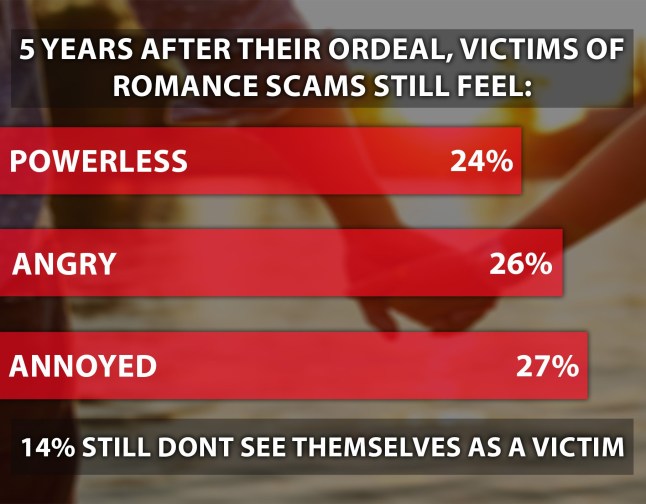
When Marisha Wallace first met James* she was instantly impressed. Handsome and smartly dressed, as if he looked like he worked in the City, he wasn’t her usual type – but it didn’t matter, she was looking for something a bit ‘different’.
James was also warm and funny. And, says Marisha, he was attentive.
‘Emotionally attentive,’ she adds. ‘He would check in on me and, whatever you thought a man was supposed to do, he would do.’
At the time, West End star Marisha had just separated from her husband of ten years and was looking forward to a fresh start in London where she was appearing in Dream Girls. New to the city and with few local friends locally, she signed up to a dating app and found James, who told her he was an accounts manager at a financial institution.
The pair immediately hit it off and saw each other casually, fitting in fun dates at bars and restaurants in the rare evenings Marisha, 39, could find between shows.
When she couldn’t find time, they would chat regularly on the phone. ‘Hewould call me after every show,’ she tells Metro. ‘His attentiveness never felt over the top. He knew I’d just got out of a relationship and wasn’t after anything too serious or heavy, but it was nice to have him around.’
A few weeks after they started dating in 2018, James casually mentioned that he’d had a good return on an investment that he’d made, which struck a chord with Marisha, who had told him her plans of making some money on her savings to buy her mum a house.
She was instantly intrigued, especially as she had no reason to distrust James at this point, remembers Marisha.
‘You know, someone recommends something, like “Oh I have this amazing suit” or “I have this amazing tax person,” and in our business, a lot comes down to recommendations, because you live in lots of different places,’ she explains. ‘I’ve had recommendations for all kinds of things, and I’ve tried them, and they’ve been great.’
Sign up to The Hook-Up, Metro’s sex and dating newsletter
Love reading juicy stories like this? Need some tips for how to spice things up in the bedroom?
Sign up to The Hook-Up and we’ll slide into your inbox every week with all the latest sex and dating stories from Metro. We can’t wait for you to join us!

Interested in whether she could do the same, James told Marisha about his accounts manager John* and she decided to give him a call.
The pair had an in-depth conversation about the money, how it would be invested in currency trading and that she could monitor her investment’s progress online. Feeling excited by the plan, Marisha decided to put in £20,000 and hoped for the best.
She was able to track her money through the website John had signed her up to and Marisha was overjoyed when she logged into her account a few weeks later and saw that she’d made £2,500.
‘I was in Vienna on holiday in August when I logged into my account. I thought, “Oh, my God, it’s working!” Then John called and asked if I got my return. It felt great, so I went and bought a designer purse,’ she recalls.
Two weeks later John called and told Marisha about another event where she could get a higher return if she invested more. Buoyed by her previous win, Marisha put her life savings into the account – another £40,000.
However, a few days later, she got a strange feeling in the pit of her stomach. She didn’t know why, but it spurred Marisha to contact John and find out what was happening to her money.

‘I called and I called and he didn’t answer. Until this point, whenever I rang him he would pick up no matter what,’ she says. ‘When he didn’t, I knew something wasn’t right and I started feeling sick.’
In desperation, Marisha called James, who she was still seeing casually, and told him she wanted her money pulled from the scheme.
When he told her to trust him and tried to calm her down, Marisha could tell something was very wrong.
‘All of a sudden I knew – it was fake. A scam. The penny dropped and I realised that James was a scammer too,’ she admits.
Marisha knew that James was her only link to the money, so she played innocent and invited him over. As they chatted in her flat, she casually asked him to remind her of his second name. The one he gave her was different to the one he’d originally used, so after he left, she contacted the company he said he worked for.

The fact that a man had wormed his way into her life, lying to her face and stealing from her was ‘probably the worst thing that has happened to me in my life,’ says Marisha.
‘It’s the betrayal of it. Before it happens to you, you think people are inherently good, but there are evil people in this world. Professional scammers, for whom this is their job.’
When James’ work didn’t recognise the name Marisha gave them, they asked for a picture of him, which she duly sent. She then received a call from a lawyer at the company who told her James was a receptionist there.
Following Marisha’s enquiry, they had investigated James’ activity and brought him in for questioning. He soon confessed that he had taken her money and sent it to an account in Turkey. Because it was offshore, Marisha had no chance of getting it back.
If you think you’ve sent money to a scammer
Keep records of all contact and correspondence between you and the scammer. This will be useful when you ask your bank – or payment service provider – to reimburse you or if you need to bring a complaint to the Financial Ombudsman.
Contact your bank or other payment service provider immediately, using the contact details on your card or statements, or by checking the Financial Services Register.
Contact the police on 101.
Report the scam to Action Fraud – the UK’s national reporting centre for fraud and cybercrime.
Shocked by the news, she called John again, who became aggressive on the phone. ‘He told me: “This is all your fault. You decided to do this. I have nothing to do with it.”’ she remembers.
Then Marisha started getting calls from strangers who would abuse her, calling her ‘a lonely bitter woman’ and even tried to extort her – demanding thousands of pounds to get her money back.
‘That’s when I started getting scared. I just couldn’t believe that people were speaking to me like that. I didn’t know if it was a gang,’ she says.

‘I was alone in the city and he knew where I lived. I was terrified that he might try to come and kill me. I had to go to sleep with my sister on FaceTime from the States on a pillow next to me.’
The next day Marisha went to the police who said they couldn’t bring about a criminal case because she had given John the money willingly. It meant that Marisha never saw James or her savings again and now recognises she could have been a victim of organised crime.
‘People like this are professional, the listen to you and say anything to gain your trust,’ she explains. ‘A lot of these men are on dating apps, preying on vulnerable women.’

Marisha – who is now in a happy relationship with a bodyguard – explains that she was mentally ‘messed up’ for a long time until she eventually accepted she had fallen victim to a master manipulator.
‘It’s not really about the money. It is about the cost to you as a person. I haven’t even got married again because of it, because I don’t trust people,’ she says. ‘I just had to try to pick up the pieces of my life.
‘There is so much shame and guilt associated with scams. In people’s minds, these things don’t happen to smart, successful people – but it’s happened to so many. It’s that betrayal of the human spirit, you just start to question everyone.
‘It took me years to feel safe again. But I’m not going to let the fear of them stop me from living my life anymore.’
How to avoid romance scammers out to get your money
Jack Kerr, Director at security platform Appdome, lists six things to watch out for on your phone.
• Use only trusted mobile apps. Fake apps or malware can steal your identity and financial information.
• Be wary of links or QR codes shared by online dating matches. Scammers often send links to malicious apps or fake websites designed to steal your personal information
• Be cautious of messages or untrusted mobile apps asking for personal details like your full name, address, passwords, or banking information.
• If someone you meet online starts calling you unexpectedly and their voice doesn’t quite match their profile, it could be an AI-generated voice designed to impersonate them.
• Deepfakes: AI-generated images can be used to lure you in or impersonate others. They can even be used to bypass Face ID and gain access to your account.
• Watch out for tall tales. Scammers often manipulate you by creating dramatic emergencies or extravagant stories designed to pull on your heartstrings, like needing help with medical bills or being in legal trouble.
*Names have been changed
